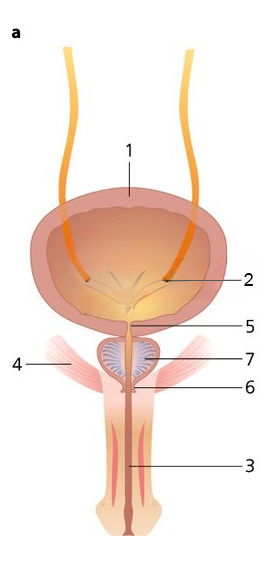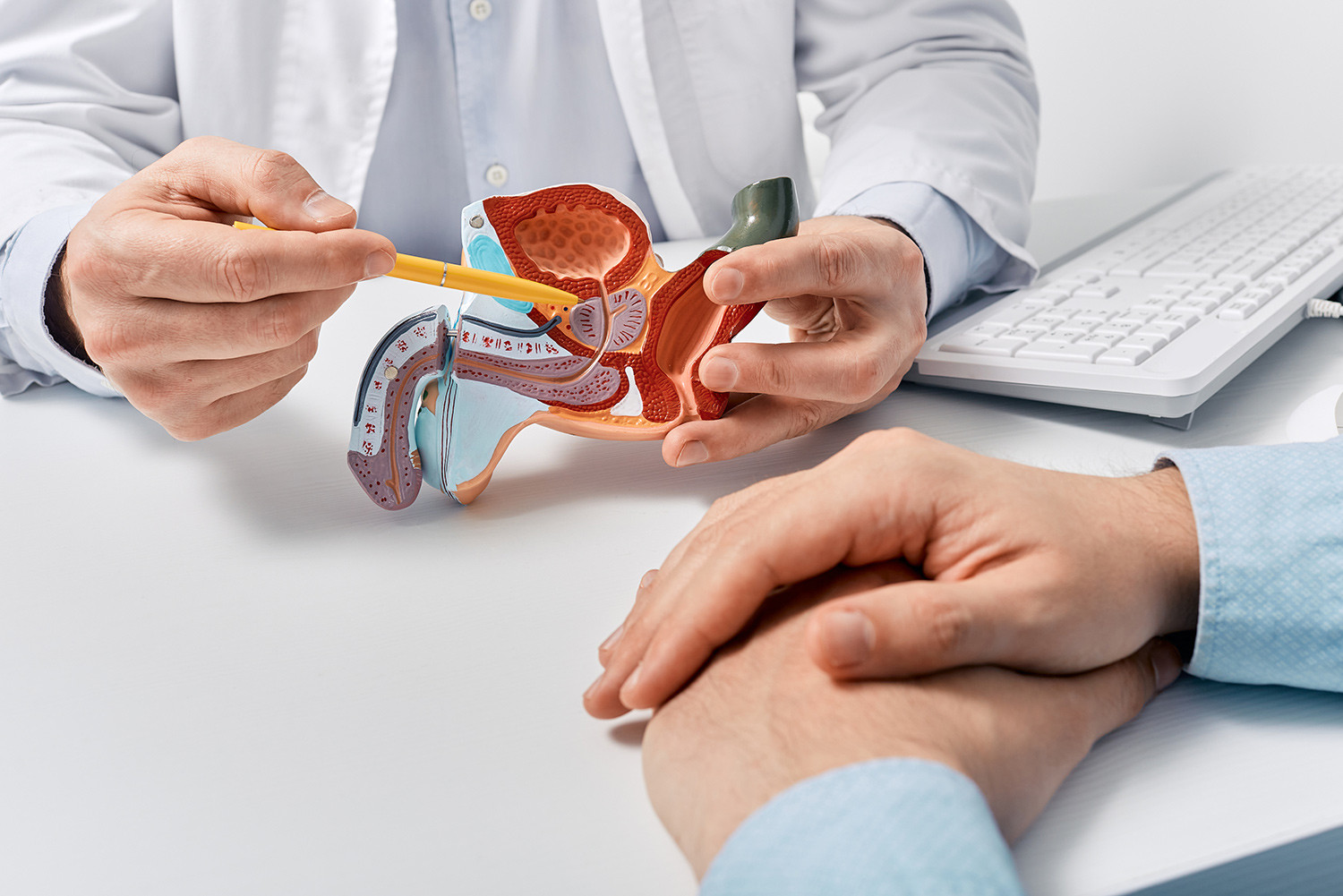Prostate Cancer Rehabilitation For Continence and Erectile Function
Prostate cancer is the most common type of cancer in men, accounting for 29% of all cancer cases. According to the Swiss Cancer League, approximately 7,100 men in Switzerland are newly diagnosed with prostate cancer each year. According to Cancer Research UK, the projected number of cases each year from 2023 to 2025 in the UK average 62,500 . With improved early detection and modern treatment methods, nowadays prostate cancer can be effectively managed. Men affected by this disease often have good chances of recovery.
However, the cancer treatment can sometimes lead to impairments in potency (ability to achieve an erection) and continence (ability to control urine flow). Erectile dysfunction and incontinence are common side effects in the treatment of prostate cancer. In some cases, these symptoms may resolve on their own after a short period of time. In other cases, permanent limitations may occur following prostate cancer surgery or radiation therapy.

Targeted prostate cancer rehabilitation (pelvic and penile rehabilitation) aims to restore the quality of life for affected men after cancer treatment and support their physical and psychological recovery to the best possible extent. The specialized doctors at the KontinenzZentrum Hirslanden in Zurich are here to assist you if you are experiencing involuntary urine loss or erectile dysfunction following cancer treatment. Please schedule an appointment for a comprehensive consultation at our center of expertise and learn about your individual examination and therapy options.
Find out about your Treatment Options for Erectile Dysfunction or Incontinence Caused by Prostate Cancer Treatment
You can reach our KontinenzZentrum Hirslanden in Zurich by e-mail. Our clinic is open Monday to Friday from 8 a.m. to 5 p.m. (Swiss time). You can also take advantage of our convenient online appointment scheduling tool.
Causes of Incontinence: Bladder Control after Prostate Removal
Incontinence is a common consequence of treatment for prostate cancer. The reason for this involuntary loss of urine is that the structure and functioning of the urinary tract change after prostate cancer surgery. In a procedure called radical prostatectomy, the prostate is completely removed, along with the internal sphincter. The urethra becomes shorter, and the external sphincter must now solely ensure a watertight closure of the bladder. If the external sphincter is not sufficiently trained or if the nerves are impaired, incontinence can occur after prostate surgery.
After prostate cancer surgery more than half of men experience involuntary urine loss, which can last for several weeks to months. After one year, two out of ten men still suffer from incontinence following prostate cancer surgery. During physical activity, such as coughing, standing up from a seated position, running, or lifting heavy objects, there may be unintentional leakage of urine. The symptoms resemble those of stress incontinence.
To restore continence after prostate removal for the treatment of prostate cancer, targeted prostate cancer rehabilitation measures are recommended. Incontinence can also occur as a result of radiation therapy for prostate cancer. The adjacent bladder can be irritated, and the nerve pathways to the penis and sphincter can be damaged by radiation therapy.
Symptoms include frequent urination during the day and night, as well as a sudden, strong urge to urinate that requires immediate emptying (imperative urgency). It is not always possible to reach the toilet in time. The symptoms resemble those of urge incontinence. Additionally, if radiation is required following prostate cancer surgery, incontinence may occur anew.
Causes of Erectile Dysfunction after Prostate Surgery or Radiation
In many patients, impotence occurs after prostate surgery when the prostate is completely removed. This is due to the course of the nerve fibers responsible for controlling erections. Erections are regulated by a delicate network of nerves in the pelvic region, which are located directly adjacent to the prostate. Therefore, during prostate cancer surgery, these nerves are at risk of damage. It is not always possible to preserve these nerves during the operation. However, if technically feasible and deemed safe for cancer treatment, a specialized surgical technique can be employed to preserve the bundle of nerves responsible for erections on one or both sides of the prostate.

The male urinary bladder: (1) the detrusor muscle, (2) the ureteral orifices, (3) the urethra, (4) the pelvic floor sphincter muscles, (5) the internal sphincter muscle (6) the external sphincter, (7) the prostate gland
Penile Rehabilitation after Prostate Removal for better Quality of Life
Nevertheless, it is expected that eight out of ten men will experience partial or complete absence of erections after prostate surgery. Erectile dysfunction of the penis can also occur after pelvic radiation for prostate cancer, typically with a delay of several months. Therefore, penile rehabilitation following prostatectomy or completion of radiation therapy is recommended to restore the quality of life for affected men.
Prostate Cancer Rehabilitation after Prostatectomy or Radiation: Treatment Options
There are various treatment options available to restore potency and continence after prostatectomy or prostate radiation. The choice of rehabilitation method and the specific goals of prostate cancer rehabilitation vary from patient to patient.
The doctor determines the individual treatment plan based on the underlying causes of the symptoms and the patient's overall health condition. Conservative methods for treating sexual dysfunctions or incontinence in prostate cancer are preferred over surgical intervention.

Goals of Continence Rehabilitation and ED Treatments after Prostatectomy or Radiation
A cancer diagnosis can be highly distressing. When erectile dysfunction and urinary incontinence are added to the already demanding treatment, many men experience significant distress over an extended period. These symptoms often affect self-esteem, daily life, and relationships. Therefore, it is crucial for individuals to seek early consultation with a urologist following prostate cancer treatment to discuss their symptoms and begin appropriate measures for rehabilitating their erectile function of the penis and continence of the bladder. This rehabilitation program focuses equally on restoring quality of life as well as on recovering physical and psychological well-being. During the consultation, the physician conducts various examinations to assess the situation and develops a therapeutic plan for prostate cancer rehabilitation.
Over a 24-week period, this prostate cancer rehabilitation program aims to restore a healthy bladder function and the ability to sustain an erection through an individualized outpatient program utilizing conservative methods.
In some cases, conservative therapy like pelvic floor exercises may not completely resolve the symptoms. In such instances, efforts are made to minimize involuntary urine loss and improve erectile function. For patients who do not respond adequately to conservative therapy, surgical options may provide further improvement.
Which Patients Benefit from the Prostate Cancer Rehabilitation Program?
Early Rehabilitation for Continence and Potency
Men who experience involuntary urine loss and/or erectile dysfunction three months after prostate cancer surgery or three months after completing radiotherapy, and who feel limited in their quality of life due to these issues, benefit from early prostate cancer rehabilitation. Regular bladder control and a healthy sex life with proper erectile funtion can be accomplished through pelvic and penile rehabilitation.
Rehabilitation in the Later Stages after Prostate Cancer Treatment
The prostate cancer rehabilitation program in the later stages after prostate cancer treatment is designed for men whose symptoms persist despite initial rehabilitation measures, like pelvic floor exercises after redical prostatectomy. These patients continue to experience involuntary urine loss and/or partial or complete loss of erectile function following prostatectomy or radiation therapy, even after conventional pelvic floor therapy. Men who undergo additional radiation therapy after prostate cancer surgery and subsequently notice involuntary urine loss and/or erectile dysfunction also benefit from participating in the prostate rehabilitation program.
Sequence of our Prostate Cancer Rehabilitation Program
The sequence of our prostate cancer rehabilitation program after radical prostate removal or radiation has three steps that involve individual evaluations, conservative therapy options as well as surgical intervention, if needed. Throughout, our specialists for neuro-urology and functional urology treat and support patients post prostate cancer surgery or radiotherapy.
Initial Evaluation and Comprehensive Consultation
After an individual medical history assessment, the physician performs a video urodynamic study tailored to assess and evaluate bladder and sphincter function in detail, specifically related to incontinence following prostate cancer therapy.
Based on these measurements, an individualized initial treatment plan is developed for each patient. This plan includes counseling regarding fluid and dietary habits, individual lifestyle factors, and strategies to enhance physical and mental well-being, taking into account the patient's personal circumstances. The cornerstone of continence therapy is an individualized pelvic floor and sphincter training program, tailored to the patient's specific pelvic floor and sphincter function based on the latest scientific findings.
If necessary, training can be intensified with low doses of regular erection-promoting medication and electrical TENS therapy. To assess erectile function, neurophysiological measurements and Doppler sonography of the penile blood vessels are performed after pharmacological stimulation. Based on these results, the physician determines appropriate measures to restore or improve erectile function.
Follow-up Evaluation at 8 to 16 Weeks
As part of the rehabilitation process following radical prostatectomy or prostate radiation therapy, two follow-up evaluations take place at 8 and 16 weeks after the initial evaluation. These evaluations aim to individually and efficiently adjust the treatment plan and achieve optimal progress with conservative therapy.
Additional elements of conservative therapy and optimization of medication are implemented based on objective parameters, such as urinary loss per 24 hours. General fitness parameters are measured, and quality of life is assessed at each evaluation.
To improve erectile function, our doctors prescribe individually adjusted doses of orally medications promoting erections or intraurethral pellets, that allow the erectile tissues to absorb medication inside the Uretha directly. These drugs are individually adjusted and combined with aids such as a vacuum pump. Specialized pelvic floor exercises tailored to improving erectile function and proper blood flow complement the treatment. Patients can discuss possible side effects that may have arisen from any of the possible treatments with their doctor to prevent any issues.
Final Evaluation after 24 Weeks
After completion of the prostate cancer rehabilitation program, a final evaluation is conducted at 24 weeks to assess the success of conservative penile therapy in restoring continence and potency. If continence and potency could not be fully restored during the prostate rehabilitation, the urologist discusses further treatment options with the patient.
These may include surgical incontinence therapy using prosthetic devices and/or activation of potency through invasive treatment options such as:
- surgical incontinence therapy with different types of artificial urinary sphincter prosthesis and/or
- the activation of potency through invasive therapy options such as corpora cavernosa injection therapy or penile prosthesis.
The choice of method to address erectile problems or incontinence after prostate cancer treatment always requires an individual assessment by a specialized physician. In some cases, it may not be possible to completely resolve incontinence or impotence.
Prof. Dr. med. André Reitz – Your Expert for Prostate Cancer Rehab
Prof. Dr. med. André Reitz, born in 1970, studied medicine in Münster and New Orleans, and completed his training as a specialist in urology in Heidelberg, Zurich, and Paris. After obtaining his habilitation in the field of neuro-urology at the University of Zurich in 2006, he was appointed as a university professor of neuro-urology at the University of Bonn in 2007. Since 2021, he has been an associate professor at the University of Mainz, where he trains aspiring doctors.
Prof. Dr. med. André Reitz is a specialist in urology and neurourology. Since 2010, he has been the head of the KontinenzZentrum at Klinik Hirslanden, a specialized center focusing on diseases and dysfunctions of the pelvic organs and pelvic floor. He actively participates in professional societies and expert committees and conducts research in the fields of neuro-urology, men's health, urinary incontinence, and erectile dysfunction.
Prof. Reitz builds on his expertise from 25 years of clinical and scientific work in functional urology and neuro-urology, including numerous urodynamic investigations and surgical interventions across the entire spectrum of functional urology and neurourology.
more than 25 years of experience in neurourology, functional urology, and female urology
more than 10,000 urodynamic investigations
more than 2,500 reconstructive surgeries on the bladder, urethra, and pelvic floor
more than 500 procedures involving pelvic floor stimulation and sacral neuromodulation
more than 250 implantations of various sphincter prostheses

Assistance with Erectile Dysfunction or Urinary Incontinence after Prostate Surgery:
Contact Prof. Dr. med. Reitz and his team for a consultation. We would be happy to inform you about your individual assessment options and about pelvic and penile rehabilitation after prostatectomy and radiation. You can reach our center (KontinenzZentrum Hirslanden) in Zurich via e-mail: kontinenzzentrum.hirslanden@hirslanden.ch. Our clinic is open from Monday to Friday between 8 a.m. and 5 p.m. (Swiss time).
You can also use our online appointment scheduling service.
